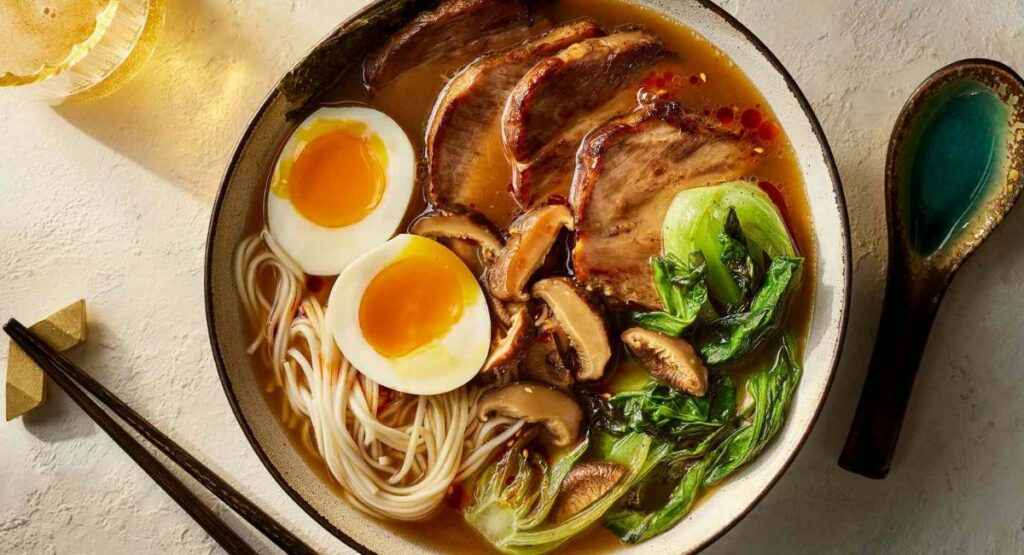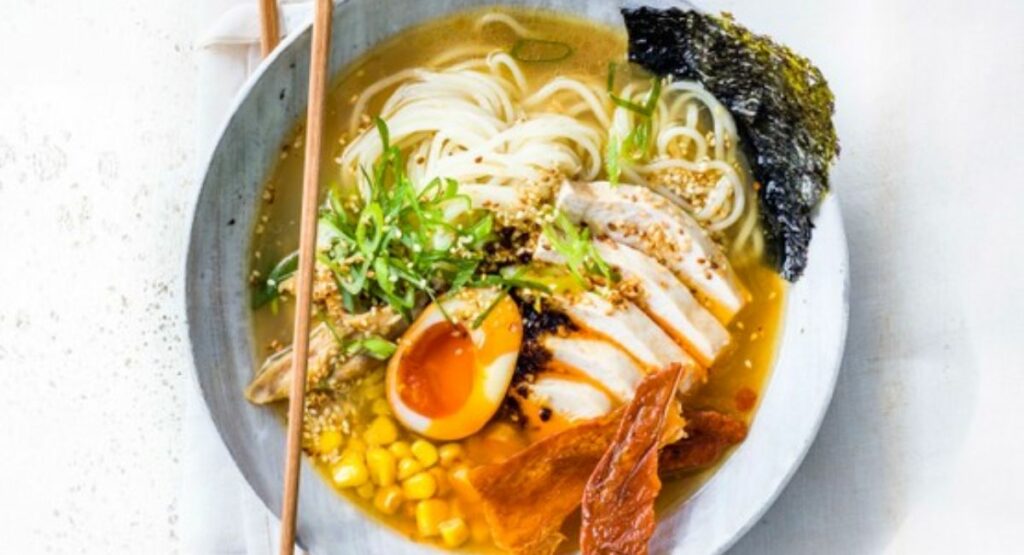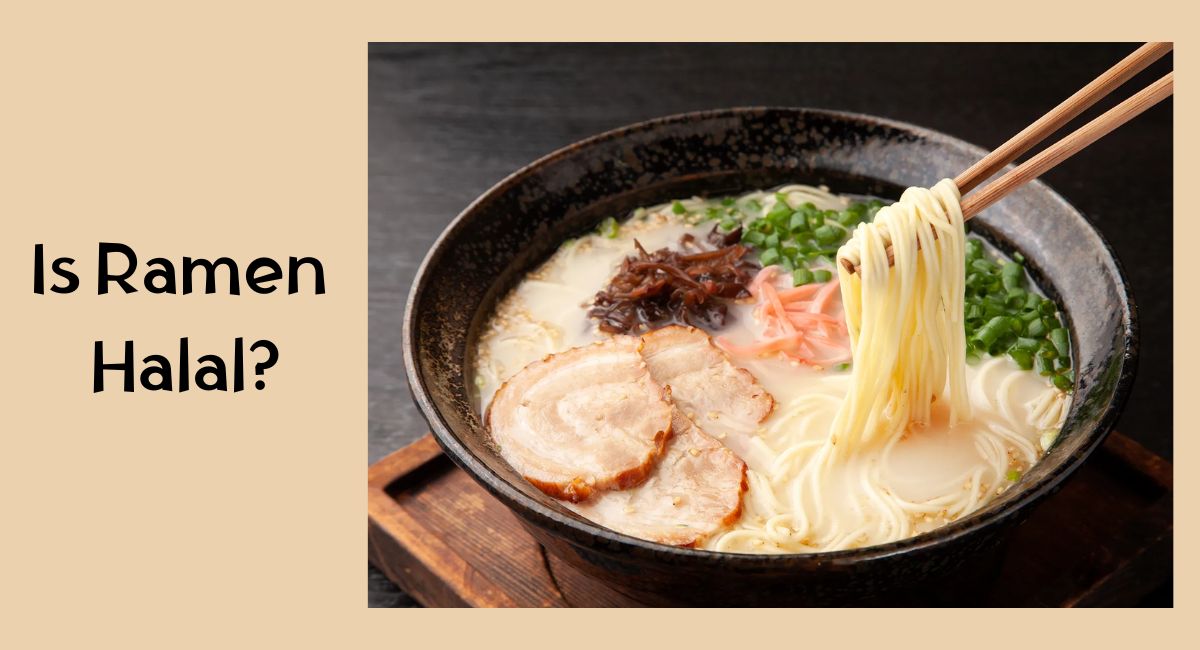Are you a fan of ramen? If so, then you may be wondering if the beloved noodle dish is considered halal. Fortunately, in this blog post, we’ll provide an answer to the question: Is ramen halal? We’ll look at the ingredients commonly used in ramen and explain why some variants of the dish can be considered halal while other versions may not be suitable for those who follow a strict halal diet. Read on to learn more about whether ramen is allowed under Islamic dietary laws and find out what you need to consider when choosing your favorite noodle dish!
Ramen

Ramen is a traditional Japanese dish that has become popular all over the world. It consists of noodles served in a broth, usually with toppings such as sliced pork, seaweed, and vegetables.
The question of whether ramen is halal or not depends on its ingredients. If ramen noodles are made from wheat flour, then they are usually considered halal as long as no other non-halal ingredients such as pork or lard are added. The broth also needs to be made from halal ingredients, such as vegetable oil, chicken stock or fish stock. Toppings must also be carefully checked to ensure that they do not contain any non-halal ingredients.
So, if all of the ingredients used to make ramen are halal, then it can be considered halal. However, if a certain product is labelled as non-halal by its manufacturer, then it should not be consumed. It is important to always check the label of any product before consuming it in order to ensure that it is halal.
When eating out at a restaurant, it is best to ask questions about the ingredients used in the ramen dish before ordering. This will help you make sure that your meal adheres to your dietary requirements. In Japan, many restaurants have become accustomed to serving halal-friendly versions of their dishes, so it is worth asking if this option is available.
Overall, ramen can be considered halal if all of the ingredients used to create it are halal. However, care should be taken when selecting products and eating out in order to ensure that no non-halal ingredients have been added. If you have any further questions about the halal status of a specific product, it is best to ask an Islamic scholar for further guidance.
Ingredients Of Ramen
Here is a detailed list of all the ingredients that go into ramen:
1. Noodles – These are usually made from wheat flour, salt, and water. Some Japanese ramen brands may use a combination of wheat flour and kansui, which is alkaline mineral water used to give the noodles their unique chewy texture.
2. Broth – The broth is the base of all ramen dishes. It’s usually made from a combination of ingredients, including dashi (fish stock), soy sauce, miso paste, mirin (sweet rice wine), and salt.
3. Seasonings – These are added to enhance the flavour of the ramen. Some common seasonings include garlic, ginger, sesame oil, chilli pepper flakes, and paprika.
4. Toppings – These are the ingredients that give ramen its signature flavour. Common toppings include scallions, bamboo shoots, nori (seaweed), soft-boiled eggs, pork or chicken slices, corn, mushrooms, bean sprouts, and fish cakes.
5. Condiments – These are used to add even more flavour to the dish. Common condiments include Japanese mayonnaise, spicy miso paste, chilli oil, and vinegar.
6. Garnishes – These are usually added for aesthetics but can also provide some additional flavour. Examples of garnishes include sesame seeds, seaweed strips, and freshly chopped scallions.
7. Drinks – Ramen is often served with a hot bowl of tea or cold beer (known as “beer-men” in Japan). Other drinks such as sake and green tea are also popular accompaniments.
8. Extras – For those looking for an even more flavorful experience, various extras can be added to ramen dishes. These include but are not limited to roasted sesame seeds, chopped garlic, narutomaki (fish cake slices), and aonori (seaweed flakes).
All of these ingredients come together to create the delicious and satisfying dish that is ramen!
How To Make Ramen?
Ramen is a delicious, hearty dish that is quick and easy to make. All you need are some basic ingredients and a few staple supplies. Here’s how to make the perfect bowl of ramen:
1. Start by boiling water in a pot on the stove. Once it’s boiling, add your preferred type of noodles. Ramen noodles are a popular choice, but there are many other types of noodles to choose from.
2. While the noodles cook, prepare your toppings and other ingredients. Common ramen toppings include eggs, seaweed, mushrooms, scallions, and fish cakes. You can also add vegetables or meat for more variety.
3. Once the noodles are cooked, strain them and add them to a bowl. Pour in some of your favourite broth (chicken or beef is a popular choice) and then top with the prepared ingredients.
4. Finally, season with salt and pepper to taste and enjoy your delicious ramen! For extra flavour, add some sesame oil or soy sauce.
With just a few simple steps, you can create an amazing bowl of ramen that will satisfy any craving. Enjoy!
Is Ramen Halal or Haram?

Ramen is a Japanese noodle dish made from wheat-based noodles and various toppings. It is considered to be a type of fast food, popular in many countries around the world. In regards to Islamic dietary regulations or halal foods, there is some confusion as to whether or not ramen is permissible.
In general, plain wheat-based noodles such as the type used in ramen dishes are halal. This is because noodles made from simple wheat flour and water are allowed under Islamic dietary regulations. However, it is important to note that some versions of ramen may contain ingredients derived from animal sources which are not halal. These include lard, pork or beef extracts, as well as other animal-derived fats or flavourings. It is therefore important to check the ingredients of any ramen dish before consuming it in order to ensure that all components are halal.
In addition, Islamic dietary regulations also prohibit the consumption of alcohol and certain herbs and spices which could be present in some ramen dishes. For this reason, it is important to read the ingredients list carefully and check with the manufacturer to ensure that no haram components are present in the dish.
In conclusion, plain wheat-based noodles such as those used for ramen are generally halal, however, some versions of ramen may contain non-halal animal products or other haram ingredients. It is therefore important to check the ingredients of any ramen dish before consumption in order to ensure that it is permissible under Islamic dietary regulations.
Which Type Of Ramen Is Halal?
When it comes to finding halal ramen, there are various types of ramen available that may be suitable for those who follow the Islamic faith. Generally speaking, any ramen that does not contain pork or alcohol is considered to be halal. This includes traditional Japanese-style ramen such as shoyu (soy sauce) ramen, shio (salt) ramen, miso (soybean paste) ramen, tonkatsu (pork bone broth) ramen and more.
When it comes to finding a halal version of these popular types of ramen, there are several different options available. For example, some restaurants and stores now offer vegetarian or vegan ramen that is made without any pork or alcohol. This type of ramen can be a great option for those looking for a halal version of their favourite dish. Additionally, many restaurants now offer halal-certified ramen dishes that have been prepared with halal ingredients.
For those who are looking for authentic Japanese-style ramen, there are also a few different halal options available. There are several restaurants in Japan that specialize in halal ramen dishes, which use halal ingredients and do not contain pork or alcohol. Additionally, some stores now offer prepackaged halal ramen noodles that can be prepared at home.
No matter which type of ramen you are looking for, there is likely to be a halal version available. With a little bit of research, it should be relatively easy to find a delicious and halal-friendly option that will satisfy your craving for ramen.
Conclusion
In conclusion, the debate over whether ramen is halal or not largely depends on the ingredients used to make it and how they are prepared. While many people believe that ramen noodles themselves are forbidden, there are still some varieties of ramen made with only permissible ingredients and methods, making them suitable for consumption by those who follow a halal diet.
Furthermore, even if some ramen noodles contain ingredients prohibited in Islam, it is still possible to substitute them for permissible ingredients and ensure that the dish remains halal. Ultimately, it is up to the individual to decide whether or not they are comfortable eating a particular type of ramen.
Therefore, all Muslims should determine for themselves whether or not the specific ingredients and preparation methods of any given ramen dish meet their dietary preferences and religious guidelines.






